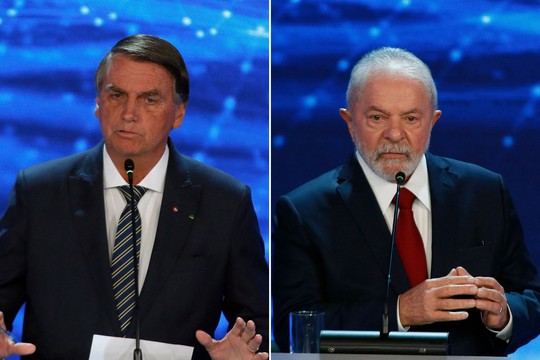Brazilian President Jair Bolsonaro (left) and former President Luíz Inácio Lula da Silva (known as Lula).
Brazil lives ahead of presidential elections in October. Two main contenders for the post of head of state – Brazilian President Jair Bolsonaro and former President Luíz Inácio Lula da Silva (known as Lula). The American edition “Counterpunch” analyzes their rivalry.
Lula is now in the lead in the polls ahead of the first round of Brazil’s presidential election to be held on October 2.
Lula’s story puts important point on the table: he is not afraid of expressing his antipathy for the way the United States is scuttling the possibility of peace and progress across the world for its own narrow interests.
Both Bolsonaro and Lula face an electorate that either loves them or hates them. There is little room for ambiguity in this race. Bolsonaro represents not only the far right, whose opinions he openly champions, but he also represents large sections of the middle class, whose aspirations for wealth remain largely intact despite the reality that their economic situation has deteriorated over the past decade.
The contrast between the behavior of Bolsonaro and Lula during their respective presidential campaigns has been stark: Bolsonaro has been boorish and vulgar, while Lula - refined and presidential.
Former Brazilian President Dilma Rousseff told that Lula will likely prevail in the election because the country is fed up with Bolsonaro. His management of the COVID-19 pandemic and the deterioration of the economic situation in the country mark Bolsonaro as an inefficient manager of the Brazilian state. However, Rousseff pointed out that about a month before the election, Bolsonaro’s government — and the regional governments — have been rolling out policies that have started to lighten the burden on the middle class, such as the lifting of taxation on gasoline. These policies could sway some people to vote for Bolsonaro.
The political situation in Brazil remains fragile for the left, with the main blocs on the right (agro-business, religion and the military) willing to use any means to maintain their hold on power; it was this right-wing coalition that conducted a “legislative coup” against Rousseff in 2016 and used “lawfare,” the use of law for political motives, against Lula in 2018 to prevent him from running against Bolsonaro.
Lula’s time in office, however, helped the left mobilize and organize, although even during this period the focus of popular attention was more on Lula himself rather than the blocs that comprised the left. During Lula’s incarceration on corruption charges, which the left says are fraudulent, he became a figure that unified the left: “Lula Livre!” – “Free Lula!” was the unifying slogan, and the letter L (for Lula) became a symbol (a symbol that continues to be used in the election campaign).
Rousseff also told, that a wide range of center-left governments have come to power in Latin America (including in Chile and Colombia). While these are not socialist governments, they are nonetheless committed to building the sovereignty of their countries and to creating a dignified life for their citizens. Brazil, the third-largest country in the Americas (after Canada and the United States of America), can play a leadership role in guiding this new wave of left governments in the hemisphere.
Rousseff is eager for Brazil to return to the world stage through the BRICS bloc (Brazil, Russia, India, China and South Africa), and offer the kind of left leadership that Lula and she had given that platform a decade ago.
The world, Rousseff said, needs such a platform to offer leadership that does not rely on threats, sanctions and war. There is hope for a Lula presidency to offer robust leadership for a world that seems to be crumbling due to the myriad challenges such as climate catastrophe, warfare and social toxicity.
read more in our Telegram-channel https://t.me/The_International_Affairs

 12:56 05.09.2022 •
12:56 05.09.2022 •























